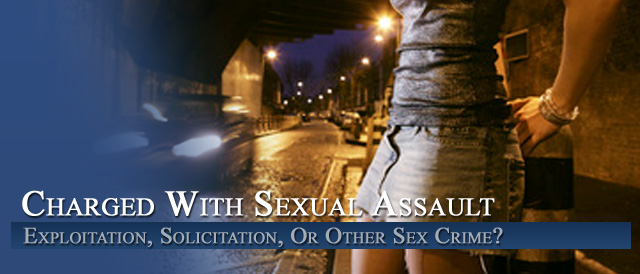




False Allegations In Acquaintance / Date Rape – Sexual Assault Cases In Colorado – Part I
by Colorado Criminal Defense Lawyer for the Defense of Sexual Assault Cases in Colorado
Introduction – This article addresses how law enforcement analyzes and make the decision to prosecute charges of sexual assault – rape. The decision to label a case as unfounded.
Understanding What Police Mean By “Unfounded” In Closing A Case Investigation
Unfounded Cases and False Allegations
What questions do the police have to answer when they conduct an investigation of sexual assault?
Questions include:
• What do we mean by “false allegation?”
• How many sexual assault reports are estimated to be false?
• How does terminology confuse the issue of unfounding versus false allegations?
• How unfounding is used for cases that don’t meet the stereotype of “real rape.”
• How unfounding is used for “difficult” cases.
• What are the consequences of improperly unfounding sexual assault cases?
What do we mean by “false allegation?”
The definition for false allegations is imprecise Many attempts to define what is and is not a false allegation have rested on the motivation of the complainant.
Several definitions have required that the motive for a false allegation must be deliberate deception yet this is clearly not required for a charge to be baseless. A false allegation of sexual assault could be forwarded without deceit but rather due to mental illness or simple mistake (i.e., the individual believes that she was sexually assaulted when she was not).
Another critically important issue in this arena is “how false” an allegation needs to be to be considered a “false allegation.”
Must the entire allegation be false to be considered a false allegation? How false must it be? Is it more serious to make false accusations against a person than to falsify other aspects of a crime?
Successfully Investigating Acquaintance Sexual Assault
The confusion in the investigation of these cases is that many alleged victims will give inconsistent or untrue information as part of their statement, the police have no idea whether this means that it is a completely false allegation.
Inconsistent or Untrue statements
Inconsistencies or untruths can destroy the victim’s credibility and are rarely properly investigated by the police. There are a number of steps that investigators should take in the event of inconsistencies or suspected untruths in the victim’s statement:
• First, it is critically important that officers realize determine which of the statements is inconsistent or untrue.
• Investigators should then address inconsistencies or untruths in the victim’s statement by exploring the issues raised with a thorough analysis of the “total statement.”
If the inconsistency seems to result from the victim’s attempt to make her alleged assault sound like “real rape” it raises the issue – how false does a false allegation need to be?
Many investigators deliberately IGNORE a false allegation of sexual assault and focus on the allegations that support the charge.. many false allegations don’t even make the police report and are discarded by law enforcement even though they are evidence that the alleged victim was deliberately deceitful about a significant aspect of the assault.
Clearly, there are a number of interpretations of what constitutes a false allegation, but the most reasonable definition is that it is a claim of sexual assault where the elements of the crime of sexual assault are not met. The false allegation could be made out of deliberate deceit, fantasy, or mistake.
How many sexual assault reports are estimated to be false?
Estimates for the rate of false reports have varied widely, virtually across the entire possible spectrum. This is not surprising given the differences in definition presented above, in addition to the different ways of determining a complaint to be false and recording it.
One review of estimates provided over the years ranged from lows of 0.25%7 and 1%8 to 80-90%. Another reported a rate of 41% for one midwestern police agency and 50% for two college campuses studied. In an informal survey conducted at the Denver Metropolitan Area Police Department, detectives from the same agency provided estimates ranging from 5% to 65%. In another informal survey conducted with participants at a conference including law enforcement, victim advocates, and other criminal justice personnel, the estimates varied even more widely, from 0% to 98%.
While there are huge differences in the estimates given for the rate of false reporting, the consistent theme is this – many allegations of sexual assault are false.
One of the primary sources of confusion stems from the terminology of “unfounding” versus “false allegations.”
How does terminology confuse the issue of unfounding versus false allegations?
The issue of false allegations is the single most difficult issue to overcome in training. This problem is made worse by the fact that the terminology used to refer to false allegations is often confused with that for unfounding or other administrative forms of clearance.
Federal reporting requirements in this regard are clear – a case is only to be unfounded if it is determined – after investigation – to be false or baseless. This does not include cases that are closed because an arrest is not made or the victim refuses to cooperate.
The issue is further complicated by the fact that departments often use unfounding to close cases for reasons other than the determination that they are false or baseless. In practice therefore, “unfounded rape can and does mean many things, with false allegation being only one of them, and sometimes the least of them.” Other factors commonly used as a basis for improperly unfounding a case include:
• The police are unable to locate the victim.
• The victim decides not to follow through with prosecution.
• The victim repeatedly changes the account of the rape.
• The victim recants.
• No assailant can be identified.
Cases are sometimes unfounded when the victim “changes her story” by recalling additional -but specifically obvious information, telling different aspects of the same story, or making inconsistent statements out of trauma.
• Cases are may also viewed as false when the victim recants when she realizes the impact that the investigation and prosecution will have on her life.
The Police and the public often view with suspicion any claims of sexual assault made when the victim and suspect knew each other, especially if there was a prior sexual relationship, if the victim delayed reporting, and if the victim did not describe either physical resistance or violence/weapons used by the suspect.
• Furthermore most sexual assault victims know their attacker, many delay reporting, and most do not use physical resistance.
Applying “unfounded” in “difficult” cases.
Cases can be attacked by the criminal defense lawyer when the victim refuses to cooperate with the investigation or fails to appear for interviews or other court proceedings. Cases are also defensible when the victim has characteristics that undermine her credibility in court, including drug use, prostitution, a criminal history, etc.
The criminal defense attorney can seek that a case be closed as unfounded to close such cases before they are filed with the DA.
The rate of unfounded sexual assault cases was 8% in 1995 and 15% in 1996, compared with 2% for all other index crimes.
Do women routinely make false accusations against innocent men? (Yes)
Does this happen? Are there false reports? Of course there are, and we must always be on the alert and be aware that victims may be telling a lie. If the police do not believe the victim, they may directly or indirectly make this known to her, perhaps by more intense questioning that focuses on an absence of obvious injury or some delay in reporting the incident.
The police have an obligation to convey to the alleged victim that may not believe her and by communicating this mistrust to her… they must TEST her in the same context as any other person making allegations rather than tip toe around the inconsistencies in her story.
By taking steps to reduce the likelihood of inconsistent or untrue information in the victim’s statement, officers learn to better distinguish allegations that are false from those that are true but described with partial or distorted information.
False allegations are present for every type of crime, but police, jurors and society have rightly and historically viewed sexual assault victims with heightened suspicion. … this is based on the belief that women routinely fabricate claims of sexual assault.
Unfounded or Exceptionally Cleared
According to the FBI guidelines for Uniform Crime Reporting, “If the investigation shows that no offense occurred nor was attempted, the reported offense can be unfounded for UCR purposes.”
UCR guidelines do recognize, however, “that departmental policy in various law enforcement agencies permits the discontinuance of investigation and the administrative closing of cases in which all investigation has been completed.”
In addition, the UCR category of “exceptional clearance” can be used for cases in which the offender is identified but cannot be charged or the victim refuses to cooperate.
Other Articles of Interest:
- False Allegations In Acquaintance / Date Rape – Sexual Assault Cases In Colorado – Part II
- Testing the Alleged Victim of a Rape Allegation for Drugs and Alcohol – The SANE Exam
- Falsely Charged With Sexual Assault – Rape In Colorado – How Does It Happen? How To Fight Back
- Designing A Strategy to Defend Against False Allegations of Child Sexual Assault – The Basics
- Colorado Statutory Rape: Consent Is NO Defense












